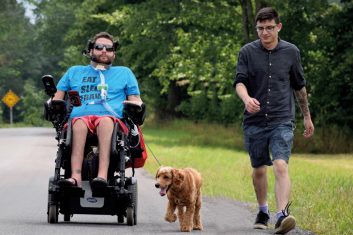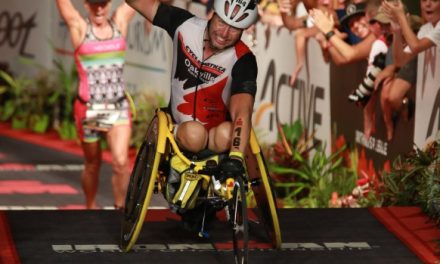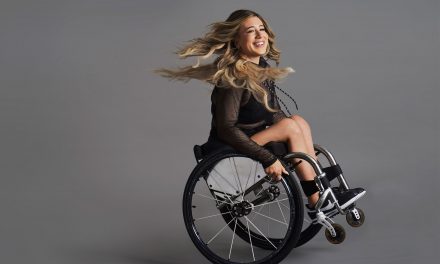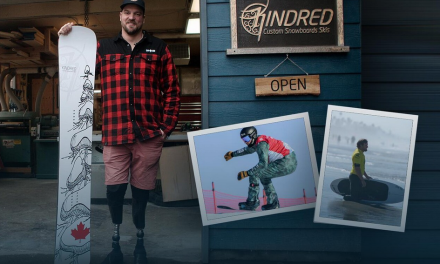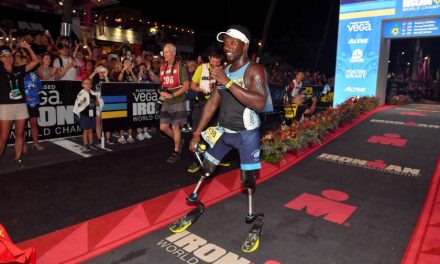Cumpson’s dog, Sawyer, takes the lead as his owner motors down the blacktop, alongside hayfields north of Amherstview and the rolling landscape upcountry from Lake Ontario’s northeastern shore. His personal support workers have trouble keeping up. One lags well behind, preserving her energy, while another quickstep alongside. The chair goes just fast enough to give Sawyer a workout and Cumpson a breeze.
A graduate of the School of Hospitality, Food and Tourism Management, Cumpson, 26, is by his own admission, a determined, stubborn and resilient person who is on a mission to live life to the fullest. He wants to help others with disabilities do the same.
Learning to live well
Over the last six years, Cumpson’s life has been one big learning curve—a difficult process of figuring out how to live well after suddenly losing the use of his arms and legs.
Earlier this year, Cumpson launched his website drewcumpson.com, the centrepiece of his H & D (Hospitality and Disability) Consulting business. With his lived experience as a quadriplegic, he advises restaurants, hotels and airlines on improving accessibility. He also coaches people with disabilities in everything from travel planning to obtaining post-secondary education and maintaining a healthy attitude.
Cumpson also advocates for better health services for people with disabilities, and lobbies for changes to the Ontario Disability Support Program so it provides more support for those wanting to get off the program, earn a living or start a business. “Yes, my life has changed,” he says, sitting in the open-space living room of the rural home built specially for him by his family. It’s purposely close to the medical services he needs in nearby Kingston. “I cannot do all the same things that I used to do, but I try to do as many as possible, in order to continue living a life that is comparable to what I would be doing if I did not have my accident. I have to go forward in life, no matter what. I am not giving up.”
Wonders of the world
A few days before the 2011 swimming accident that altered his life, Cumpson was looking out over Peru’s Andes Mountains from the Inca citadel of Machu Picchu, among the seven wonders of the world. He vowed then to visit the remaining six. It was one of his last experiences on foot.
Unaccustomed to world travel as a person with a disability, he nevertheless persevered and, true to his promise to himself he visited Mexico’s Chichen Itza in early 2016. While he encountered many obstacles and inaccessible places, it inspired him.
“I’ve always been someone who, once something is in my mind, I am going to focus on completing that task, no matter what.”
In May 2011, Cumpson was part of a University of Guelph humanitarian trip to Peru, helping to improve the lives of local people living in poverty. On the last day of the volunteer trip, he was swimming in the Pacific Ocean. One especially powerful wave drove him head first into the rocky ocean floor. The impact fractured the fourth cervical vertebra in his spine.
“I don’t really recall the first two or three weeks after the accident,” he says. Paralyzed from the armpits down, he spent 16 months in intensive care at Kingston General Hospital. There were many complications. He was transferred to the former St. Mary’s of the Lake facility for complex continuing care, where he spent three years.
Now, Cumpson lives at home in a decidedly non-clinical setting. He requires round-the-clock care. Medical specialists monitor his health. He needs a ventilator to breathe and a pacemaker to ensure his heart rate remains above 60 beats per minute.
Sticking with U of G
It was at St. Mary’s that he decided to resume his studies at University of Guelph. He had been away for five semesters. The option of transferring to Queen’s University in Kingston was suggested, but he said no. He would stick with what he called U of G’s “best in the nation” hospitality program.
“I wanted to show that even though you have a disability, you can still do everything from an educational perspective,” says Cumpson, whose tattoo of a leaping Moby Dick on his left bicep is a symbol of his own story of strength and survival.
After starting back at the University in January 2013, he learned that his mother was diagnosed with cancer. She fought a strong battle, he says, but died on July 17 that year. Cumpson persevered. He took all the distance education classes he could. Skype allowed him to attend further courses remotely. Other students took notes for him. Faculty and staff did whatever was necessary to make it happen. “They were just amazing,” Cumpson says.
Mike von Massow, now a professor at the U of G’s Department of Food, Agricultural and Resource Economics, was teaching in the College of Business and Economics when Cumpson made his return to his studies. “I don’t think I’ve ever seen anything like it,” says von Massow. “His commitment to finishing the program—and the support he got from other students—was admirable. It
really was amazing. It was inspirational when he came across the stage to graduate.”
A thread of optimism
Cumpson’s body is confined, but his mind is unconstrained. It darts and dashes, keeping him awake at night. “My brain never shuts off,” he says. “It does not shut off at all,” and while he is bombarded by thoughts about his future, his consulting business, the challenges he faces and how best to overcome them, there is a connecting thread of optimism running through it all. “I’ve honestly never seen him have a negative day,” says Madison Simmons, a best friend. “He’s always positive. He’s just so driven. When he sets his mind to something, he has to see it through.”
Before his accident, Cumpson had no idea of the challenges facing people with disabilities. “As someone who went from being able-bodied to disabled in an instant, I realized very quickly how inaccessible it is, and how many barriers there are in this world for people living with disabilities of any kind.”
Different abilities
Yet Cumpson doesn’t think of himself as disabled. “In terms of my disability, I look at it more as not really a disability, but something along the lines of just having different abilities now than what I had before. My abilities in life have changed, but I still have these other abilities to push forever and work through in life.”
Rob O’Flanagan is a staff writer in the University of Guelph’s Department of Communications and Public Affairs. He spent over 20 years as an award-winning newspaper reporter and photojournalist.
Originally published in Abilities Magazine

